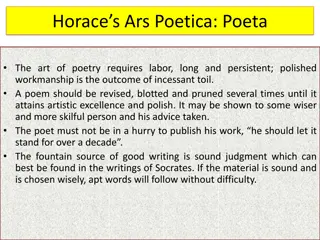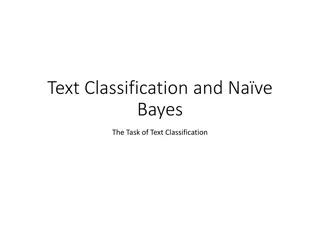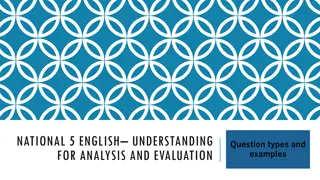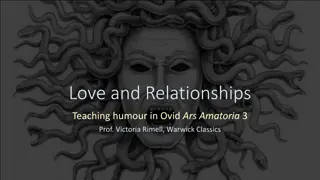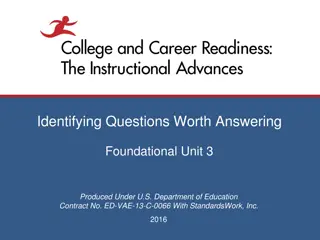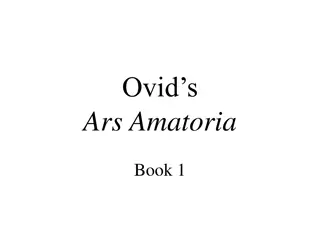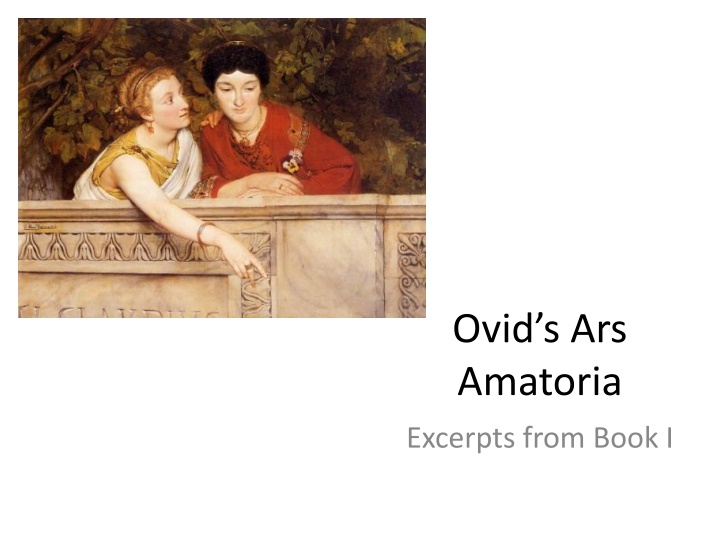
Excerpts from Ovid's Ars Amatoria Book I
Explore excerpts from Book I of Ovid's Ars Amatoria, focusing on deponent verbs, rhetorical devices, figures of speech, and classical allusions. Dive into the rich language and imagery of Ovid's work.
Download Presentation

Please find below an Image/Link to download the presentation.
The content on the website is provided AS IS for your information and personal use only. It may not be sold, licensed, or shared on other websites without obtaining consent from the author. If you encounter any issues during the download, it is possible that the publisher has removed the file from their server.
You are allowed to download the files provided on this website for personal or commercial use, subject to the condition that they are used lawfully. All files are the property of their respective owners.
The content on the website is provided AS IS for your information and personal use only. It may not be sold, licensed, or shared on other websites without obtaining consent from the author.
E N D
Presentation Transcript
Ovids Ars Amatoria Excerpts from Book I
praecipue, adv = especially venare is an imperative, from venor, venari, venatus sum Notice that venor is a deponent verb; positive imperatives in deponent verbs are formed differently than regular verbs What looks like a regular infinitive is actually the imperative of a deponent verb The 2ndperion pl. is used to construct the pl imp venor, venari becomes venare in the sing imp and venamini in the pl imp fateor, fateri becomes fatere in the sing imp and fatemini in the pl imp egredior egredi becomes egredere in the sing imp and egredimini in the pl imp ordior, ordiri becomes ordire in the sing imp and ordimini in the pl imp 1) 2) 3) 4) 5) 6) 7) 8) 9) 10) Sed tu praecipue curvis venare theatris: Haec loca sunt voto fertiliora tuo. Illic invenies quod ames, quod ludere possis, Quodque semel tangas, quodque tenere velis. Ut redit itque frequens longum formica per agmen, Granifero solitum cum vehit ore cibum, Aut ut apes saltusque suos et olentia nactae Pascua per flores et thyma summa volant, Sic ruit ad celebres cultissima femina ludos: Copia iudicium saepe morata meum est. Notice the neut pl ending on the comp in line 2 votum, -i = vow/ wish What rhetorical device occurs in line 4? frequens, frequentis = crowded What rhetorical device is being ontroduced by the ut in line 5? formica, -ae = ant granifer, granifera, graniferum = grain carrying solitus, -a, -um = accustomed saltus, saltus = glade olens, olentis = odorous pascuum, pascui = pasture
Spactatum is a supine (the 4th principal part of a verb with 4th declension endings) In the acc., the supine expresses purpose to In the abl., the supine is an abl of respect with respect to / to Do not get supines (4th declension) mixed up with perfect passive participles (1st and 2nd declension) Notice the purpose clause in line 11; what is the subjunctive verb? castus, -a, -um = pure pudor, pudoris (m) = sense of shame What is the case of Romulus in line 13? A sudden turning to address someone or something whether they are truly present or imagined is a figure of speech known as APOSTROPHE Line 13 is the beginning of an extended allusion to a famous legend about the beginnings of Rome. 11) Spectatum veniunt, veniunt spectentur ut ipsae: 12) Ille locus casti damna pudoris habet. 13) Primus sollicitos fecisti, Romule, ludos, 14) Cum iuvit viduos rapta Sabina viros. 15) Tunc neque marmoreo pendebant vela theatro, 16) Nec fuerant liquido pulpita rubra croco; 17) Illic quas tulerant nemorosa Palatia, frondes 18) Simpliciter positae, scena sine arte fuit; 19) In gradibus sedit populus de caespite factis, 20) Qualibet hirsutas fronde tegente comas. viduus, -a, -um = widowed velum, -i = canvas/ sail/ covering pulpitum, -i = stage crocus, -i = saffron nemorosus, -a, -um = well-wooded frons, frondis (f) = foliage/ leaves craespes, craespitis (m) = grassy sod qualibet, adv = anyway they pleased hirsutus, -a, -um = shaggy
sibi is dat of possession; dative case can sometimes be used to show possession (e.g. quid est nomen tibi = what is your name) rudis, -is, -e = undeveloped/ unrestrained praebeo, praebere, praebui, praebitus = present ludius, ludii = dancer careo, carere, carui, caritus = be without/ lack 21) Respiciunt, oculisque notant sibi quisque puellam 22) Quam velit, et tacito pectore multa movent. 23) Dumque, rudem praebente modum tibicine Tusco, 24) Ludius aequatam ter pede pulsat humum, 25) In medio plausu (plausus tunc arte carebant) 26) Rex populo praedae signa petita dedit.
protinus, adv = headlong/ immediately fateor, fateri, fassus sum = confess What figures of speech are being used in lines 29 and 30? What kind of verb is timuere in line 31? 27) Protinus exiliunt, animum clamore fatentes, 28) Virginibus cupidas iniciuntque manus. 29) Ut fugiunt aquilas, timidissima turba, columbae, 30) Ut fugit invisos agna novella lupos: 31) Sic illae timuere viros sine more ruentes; 32) Constitit in nulla qui fuit ante color.
Notice the chiasmus in line 33 (and throughout); what rhetorical devices follow in lines 34-38? lanio, laniare = tear/ mangle maestus, -a, -um = unhappy/ mournful queror, queri, questus sum = complain genialis, -is, -e = connected with marriage/ nuptial decet, decere, decuit = it is proper/ it ought/ it becomes 33) Nam timor unus erat, facies non una timoris: 34) Pars laniat crines, pars sine mente sedet; 35) Altera maesta silet, frustra vocat altera matrem: 36) Haec queritur, stupet haec; haec manet, illa fugit; 37) Ducuntur raptae, genialis praeda, puellae, 38) Et potuit multas ipse decere timor.
Siqua = If she comes, comitis (m) = companion/ comrade sinus, sinus = curve/ fold/ bosom/ embrace quid in this context means why tener, tenera, tenerum = tender ocellus, ocelli = eye What rhetorical device is being used inline 43? What s up with scisti ? commodum, -i = covenience/ benefit/ advantage scilicet, adv = obviously 39) Siqua repugnarat nimium comitemque negabat, 40) Sublatam cupido vir tulit ipse sinu, 41) Atque ita 'quid teneros lacrimis corrumpis ocellos? 42) Quod matri pater est, hoc tibi' dixit 'ero. 43) Romule, militibus scisti dare commoda solus: 44) Haec mihi si dederis commoda, miles ero. 45) Scilicet ex illo sollemnia more theatra 46) Nunc quoque formosis insidiosa manent. formosus, -a, -um = beautiful; here it is substantive insidiosus, -a, -um = treacherous/ deceitful
Notice how what logically should be the object of the sentence in line 47 is actually the subject. capax, capacis = large/ spacious Nec opus est = there is no need (takes the abl) arcanum, arcani = secret nutus, nutus = nod accipienda should be recognized as a gerundive nd- gerundives in the nomwith est mean must ; the subject then is in the dat (of agent) and the obj is nom (lit., SUBJ MUST BE VERBED BY THE DAT, or in better Eng. the DAT MUST VERB the SUBJ) gerundives in nomwith causa mean for the sake of gerundives in the accwith ad mean for the purpose of gerundives in the genmean of and in the ablmean by 47) Nec te nobilium fugiat certamen equorum; 48) Multa capax populi commoda Circus habet. 49) Nil opus est digitis, per quos arcana loquaris, 50) Nec tibi per nutus accipienda nota est: 51) Proximus a domina, nullo prohibente, sedeto, 52) Iunge tuum lateri qua potes usque latus; 53) Et bene, quod cogit, si nolis, linea iungi, 54) Quod tibi tangenda est lege puella loci. 55) Hic tibi quaeratur socii sermonis origo, 56) Et moveant primos publica verba sonos. Notice the abl abs in line 51 sedeto is an example of the fut imp (a command to be carroed out in the future); it is constructed by 3rd pers sing + o iungo, iungere = join usque = straight on/ all the way supply est with bene How would you translate tibi tagenda est ? tibi again is dat of agent in line 55 sermo, sermonis (m) = conversation
How would you translate facito inline 57? studiosus, -a, -um = eager/ full of zeal What case does favet take? caelestis, caelestis (c) = divinity eburnus, -a, -um = ivory Utque = and as gremium, gremii = lap excutio, excutere, excussi, excussus = shake out/ shake off quaelibet = whatever you please sit is pres subj of sum, meaning let aptus, -a, -um = suitable 57) Cuius equi veniant, facito, studiose, requiras: 58) Nec mora, quisquis erit, cui favet illa, fave. 59) At cum pompa frequens caelestibus ibit eburnis, 60) Tu Veneri dominae plaude favente manu; 61) Utque fit, in gremium pulvis si forte puellae 62) Deciderit, digitis excutiendus erit: 63) Etsi nullus erit pulvis, tamen excute nullum: 64) Quaelibet officio causa sit apta tuo.
inmundus, -a, -um = filthy sedulus, -a, -um = attentive Notice the irreular imp effer in line 66 humus, humi (f) = ground protinus, adv = headlong/ immediately Notice the abl abs in line 67 Because of contingent in line 68, the gerundive must be translated more literally, do you remember how to do that? praeterea, adv = besides pulvinus, pulvini = cushion Notice the authors editorial interjection at the beginning of line 71; is this meant for the unnamed person just mentioned, or for the girl herself who is referred to afterwards? Also, notice how the next few sentences employ indirect statement 65) Pallia si terra nimium demissa iacebunt, 66) Collige, et inmunda sedulus effer humo; 67) Protinus, officii pretium, patiente puella 68) Contingent oculis crura videnda tuis. 69) Respice praeterea, post vos quicumque sedebit, 70) Ne premat opposito mollia terga genu. 71) Parva leves capiunt animos: fuit utile multis 72) Pulvinum facili composuisse manu. 73) Profuit et tenui ventos movisse tabella, 74) Et cava sub tenerum scamna dedisse pedem. prosum, prodesse, profui, profuturus = be useful/ be advantageous/ profit tenuis, tenuis, tenue = thin (remember the i in 3rd decl abl sing for an adj) tabella, -ae = writing tablet/ ballot/ leaflet cavus, -a, -um = hollow scamnum, scamni = stool
aditus, -us = approach We move on to another place of entertainment in line 76. What event is being referred to by the use of the word harena ? Why is this taking place in the Forum? What allusion is being made inline 77? How is this an example of metonymy? How is irony employed in line 78? posco, poscere, poposci = demand pignus, pigneris (n) = pledge/ hostage. bet uter = which one saucius, -a, -um = wounded munus, muneris (n) = gift/ tribute 75) Hos aditus Circusque novo praebebit amori, 76) 77) Illa saepe puer Veneris pugnavit harena, 78) Et qui spectavit vulnera, vulnus habet. 79) Dum loquitur tangitque manum poscitque libellum 80) Et quaerit posito pignore, vincat uter, 81) Saucius ingemuit telumque volatile sensit, 82) Et pars spectati muneris ipse fuit. Sparsaque sollicito tristis harena foro.
modo here means just recently Persidus, -a, -um = Persian Cecropius, -a, -um = Greek ratis, ratis (f) = raft/ boat nempe = surely/ certainly What is the person, number, and tense of evenere in line 86? quam in line 88 means how advenus, -a, -um = arriving/ foreign/ migrant torqueo, torquere, torsi, tortus = twist 83) Quid, modo cum belli navalis imagine Caesar 84) Persidas induxit Cecropiasque rates? 85) Nempe ab utroque mari iuvenes, ab utroque puellae 86) Venere, atque ingens orbis in Urbe fuit. 87) Quis non invenit turba, quod amaret, in illa? 88) Eheu, quam multos advena torsit amor!



